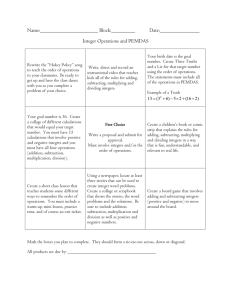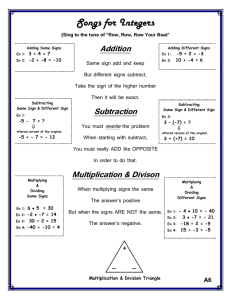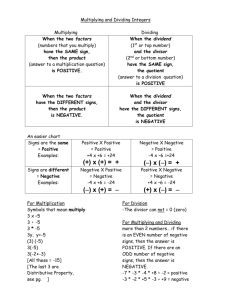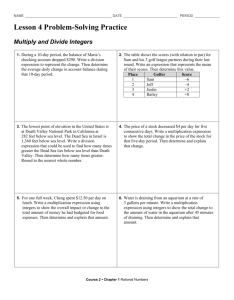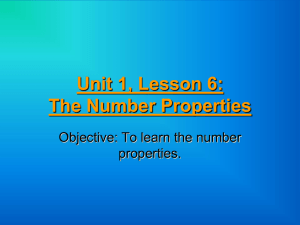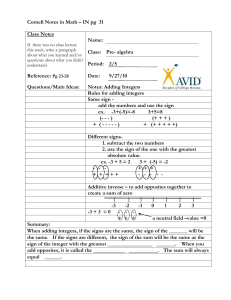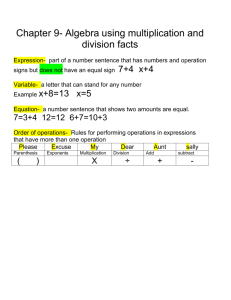Multiplication
advertisement
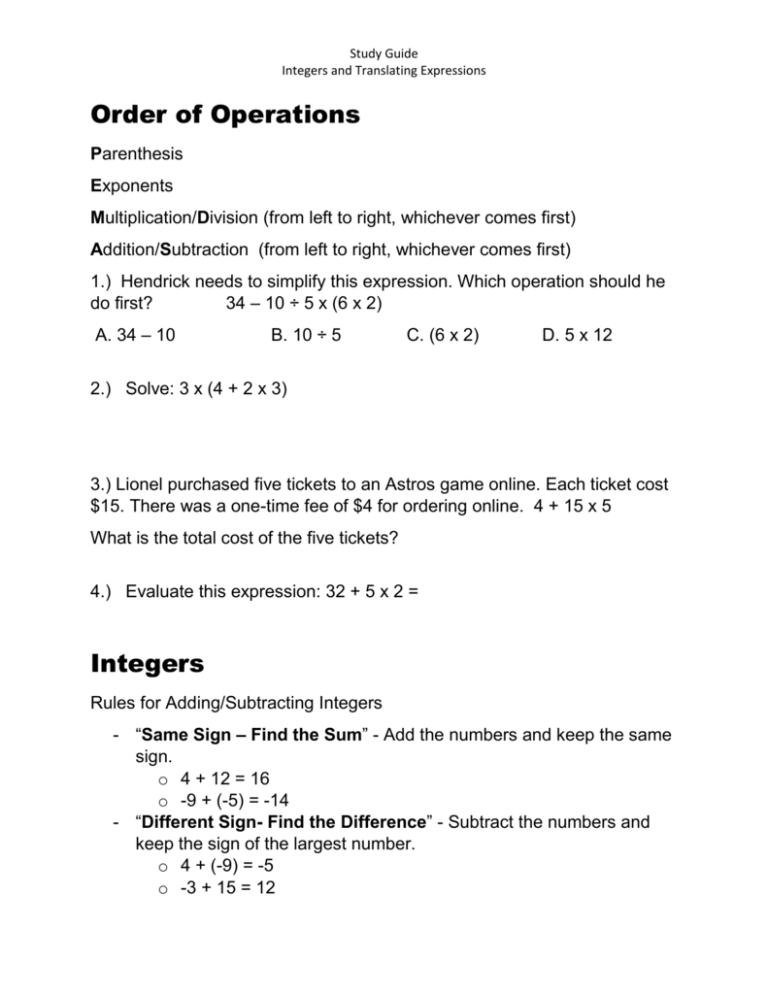
Study Guide Integers and Translating Expressions Order of Operations Parenthesis Exponents Multiplication/Division (from left to right, whichever comes first) Addition/Subtraction (from left to right, whichever comes first) 1.) Hendrick needs to simplify this expression. Which operation should he do first? 34 – 10 ÷ 5 x (6 x 2) A. 34 – 10 B. 10 ÷ 5 C. (6 x 2) D. 5 x 12 2.) Solve: 3 x (4 + 2 x 3) 3.) Lionel purchased five tickets to an Astros game online. Each ticket cost $15. There was a one-time fee of $4 for ordering online. 4 + 15 x 5 What is the total cost of the five tickets? 4.) Evaluate this expression: 32 + 5 x 2 = Integers Rules for Adding/Subtracting Integers - “Same Sign – Find the Sum” - Add the numbers and keep the same sign. o 4 + 12 = 16 o -9 + (-5) = -14 - “Different Sign- Find the Difference” - Subtract the numbers and keep the sign of the largest number. o 4 + (-9) = -5 o -3 + 15 = 12 Study Guide Integers and Translating Expressions Rules for Multiplying/Dividing Integers - Multiplying and Dividing TWO Integers with the SAME SIGNS, the answer is always POSITIVE. o 4 𝑥 20 = 80 o −8 ÷ (−2) = +4 - Multiplying and Dividing TWO Integers with DIFFERENT SIGNS, the answer is always NEGATIVE. o −9 𝑥 2 = -18 o 12 ÷ (−6) = 2 Mathematical Properties The commutative property states that order does not matter. Multiplication and Addition are commutative. Examples: A. 5 + 3 + 2 = 5 + 2 + 3 B. 𝑏 + 𝑎 = 𝑎 + 𝑏 C. 4 ∙ 2 = 2 ∙ 4 D. 𝑎 ∙ 𝑏 = 𝑏 ∙ 𝑎 The associative property states that you can add or multiply regardless of how the numbers are grouped. By ‘grouped’ we mean ‘how you use parenthesis.’ In other words, if you are adding or multiplying, it does not matter where you put the parenthesis. Add some parenthesis any where you like. 1.) 𝑎 + (𝑏 + 𝑐) = (𝑎 + 𝑏) + 𝑐 2.) (2 + 7) + 5 = 2 + (7 + 5) 9 + 5 = 2 + 12 14 = 14 3.) (𝑎 × 𝑏) × 𝑐 = 𝑎 × (𝑏 × 𝑐) 4.) (6 × 5) × 7 = 6 × (5 × 7) 30 × 7 = 6 × 35 210 = 210 Study Guide Integers and Translating Expressions The Identity property of addition states that the sum of zero and any number or variable is the number or variable itself. For example, 4 + 0 = 4, - 11 + 0 = - 11, y + 0 = y are few examples illustrating the identity property of addition. The Identity property of multiplication states that the product of 1 and any number or variable is the number or variable itself. For example, 4 × 1 = 4, - 11 × 1 = - 11, y × 1 = y are few examples illustrating the identity property of multiplication. The Distributive Property of Multiplication is the property that states that multiplying a sum by a number is the same as multiplying each addend by the number and then adding the products. The Distributive Property says that if a, b, and c are real numbers, then 𝑎 × (𝑏 + 𝑐) = (𝑎 × 𝑏) + (𝑎 × 𝑐) For example, 3 × (4 + 5) = (3 × 4) + (3 × 5) 3 × 9 = (12 + 15) 27 = 27 Algebraic Expressions Vocabulary: - Addition o plus o and o total of o more than altogether combined sum added to increased by add together in all - Subtraction o subtract o decrease by o shared o difference gave fewer fewer than less take away minus less than Study Guide Integers and Translating Expressions - Multiplication o times triple o product multiplied by o increased by a factor double of twice - Division o quotient of o divided by o divided into ratio of divisor split up - Equals o Is o Will be per half percent are yields were sold for multiple was - Parenthesis words o the quantity of twice the sum of times the sum of o times the difference of plus the difference of 1.) 2 𝑡𝑖𝑚𝑒𝑠 𝑦 𝑠𝑞𝑢𝑎𝑟𝑒𝑑 2 𝑥 𝑦2 2.) 𝑂𝑛𝑒 − ℎ𝑎𝑙𝑓 𝑡ℎ𝑒 𝑝𝑟𝑜𝑑𝑢𝑐𝑡 𝑜𝑓 𝑥 𝑎𝑛𝑑 𝑦 - 1 2 (𝑥𝑦) 3.) 3𝑥 − 4 3 𝑡𝑖𝑚𝑒𝑠 𝑥 𝑚𝑖𝑛𝑢𝑠 4 3 4.) (𝑎 + 𝑏) 𝑡ℎ𝑒 𝑐𝑢𝑏𝑒 𝑜𝑓 𝑎 𝑝𝑙𝑢𝑠 𝑏 5.) 𝑡ℎ𝑟𝑒𝑒 𝑡𝑖𝑚𝑒𝑠 𝑡ℎ𝑒 𝑠𝑢𝑚 𝑜𝑓 𝑎 𝑎𝑛𝑑 𝑏 3(𝑎 + 𝑏) 6.) 𝑡ℎ𝑒 𝑞𝑢𝑜𝑡𝑖𝑒𝑛𝑡 𝑜𝑓 𝑚 𝑎𝑛𝑑 𝑛 𝑚÷𝑛

